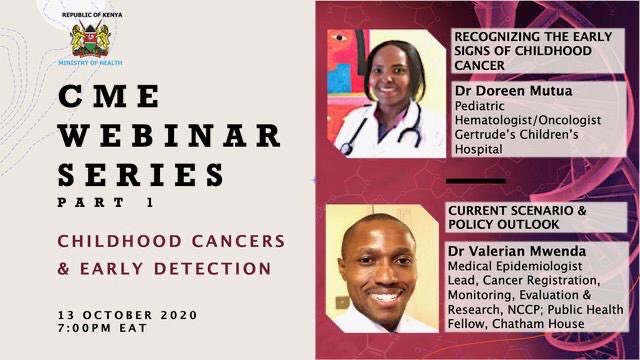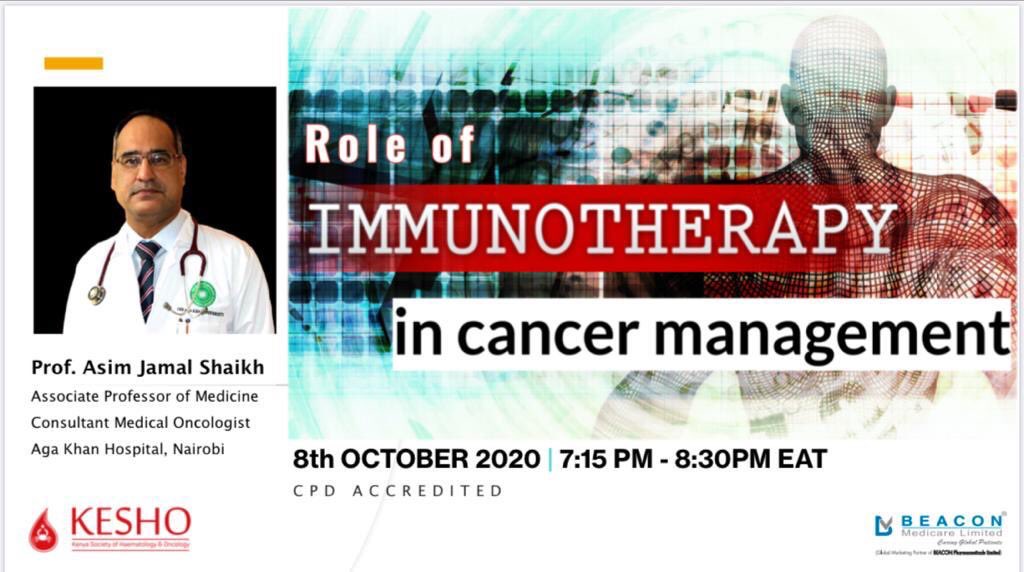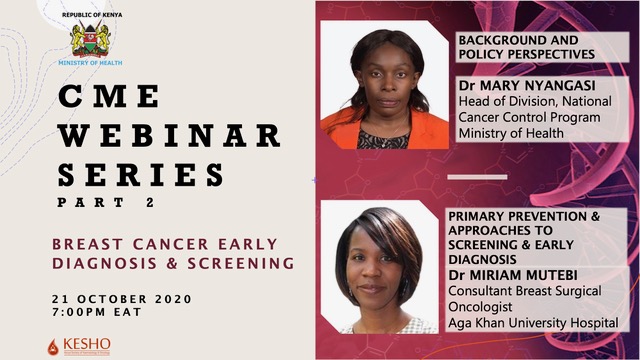
- This event has passed.
Childhood Cancers and Early Detection
Event Navigation

Moderator: Dr. Sitna Mwanzi
Presenters:
- Dr. Valerian Mwenda, Medical epidemiologist, Lead Cancer registration, Monitoring, Evaluation and Research, Division of National Cancer Control Program, Ministry of Health.
- Dr. Doreen Karimi Mutua, Paediatric, hematologist/ oncologist, Gertrude’s Children’s Hospital, Childhood Cancer Initiative
Childhood cancer is becoming a public health crisis in the developing world. In high-income countries, the childhood cancer prevalence is only 20%, with up to 80% cure rates. Low and middle-income countries account for 80% of all new cancer cases and less than 20% survival rates. In 2018, 3000 new cases of childhood cancers were reported in Kenya, where the survival rate is less than 19-30%. The low survival rate is attributed to the late presentation of patients, lack of knowledge and awareness of symptoms and signs among health care workers, weak referral systems, few cancer diagnostic and treatment centers, cultural beliefs and myths, and financial constraints. To overcome these challenges, there is a need to raise awareness among caregivers and health care workers on early warning signs, encourage health-seeking behavior among Kenyans, strengthen referral systems to avoid time wastage, equip and train staff to diagnose and treat, adopt evidence-based protocols for the treatment of cancer patients, maintain data on the outcomes, and use it for treatment and resource planning. The global initiative for childhood cancer target for 2030 is to realize a double cure rate, ensuring at least 60% survival for children with cancer globally, and reducing suffering for all. To achieve this, efforts are being put in place to increase the capacity of countries to provide quality services for children with cancer, and to increase the prioritization of childhood cancer at the global, regional, and national levels. According to Kenya National Cancer Registry, the most common childhood cancers are Leukemia, Retinoblastoma, Renal, Lymphoma, and Central Nervous System. The risk factors are majorly unknown, though exposure to ionizing radiation and infectious agents has been associated with some cancers. The goal of the Kenya Cancer Policy is to provide a multi-sectoral framework to comprehensively address the cancer burden in the country. The national cancer control strategy (2017-2022) aims to optimize treatment and palliative care for childhood cancers. The national cancer screening guidelines guide early diagnosis while the national cancer treatment protocols guide treatment. Barriers to effective childhood cancer control include a low level of awareness, low index of suspicion among the caregivers, poor referral systems, and inadequate access to palliative care. Other system challenges include poor access to health care, lack of finances, and inadequate surveillance and tracking systems. To counter these challenges the ministry of health Kenya is increasing advocacy, training among the health care providers, and universal health coverage. Early detection of childhood cancer is key to improved survivorship and health outcomes, timely access to treatment and care, lower intensity of treatment, cost-saving for families and health systems, and a lower burden of short and long-term toxicity.
Webinar Recording

